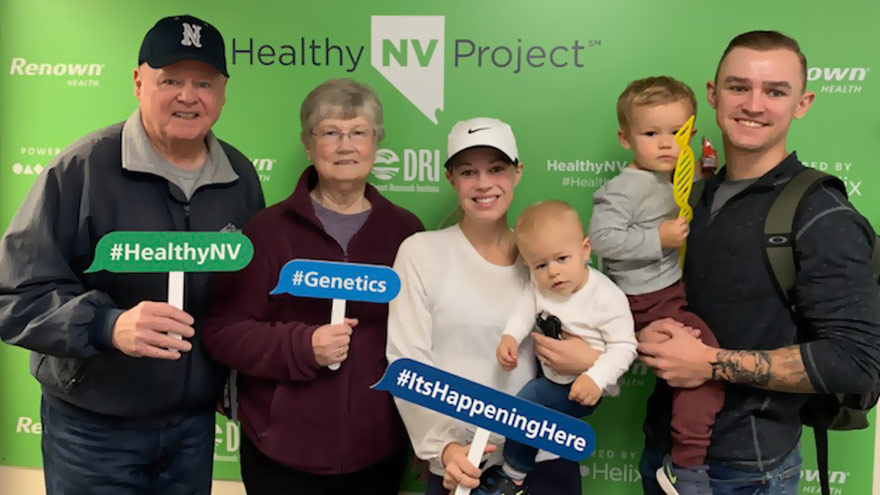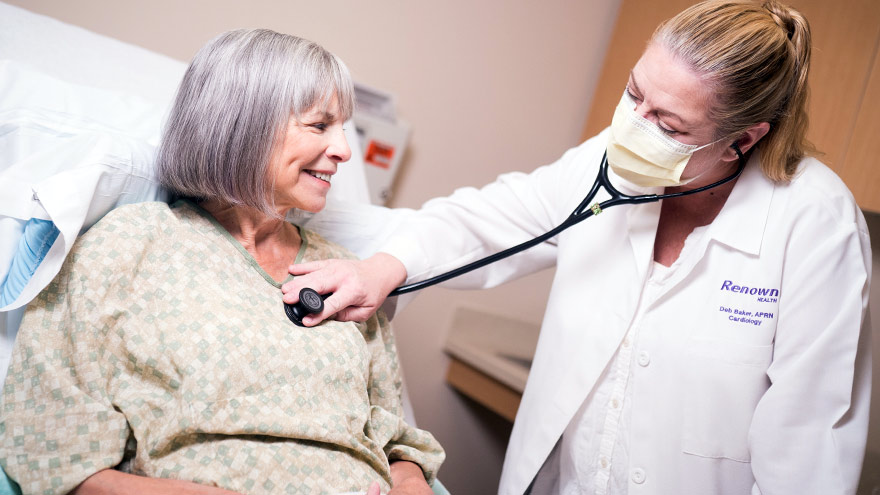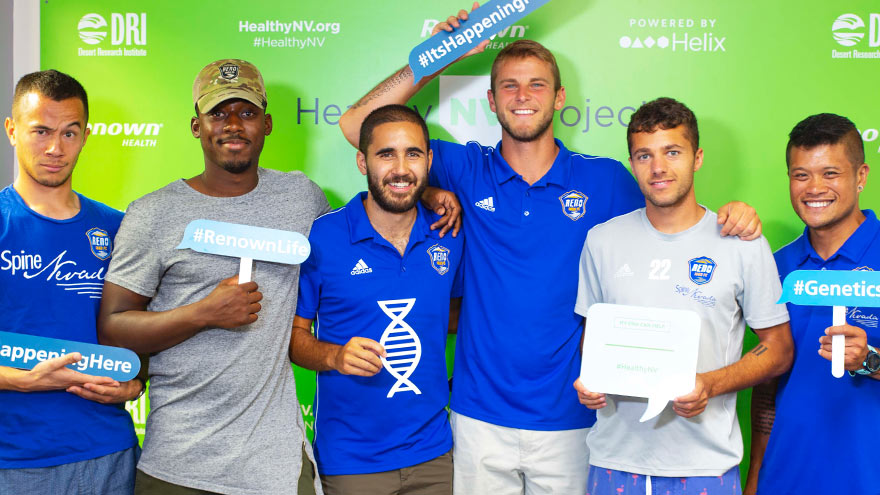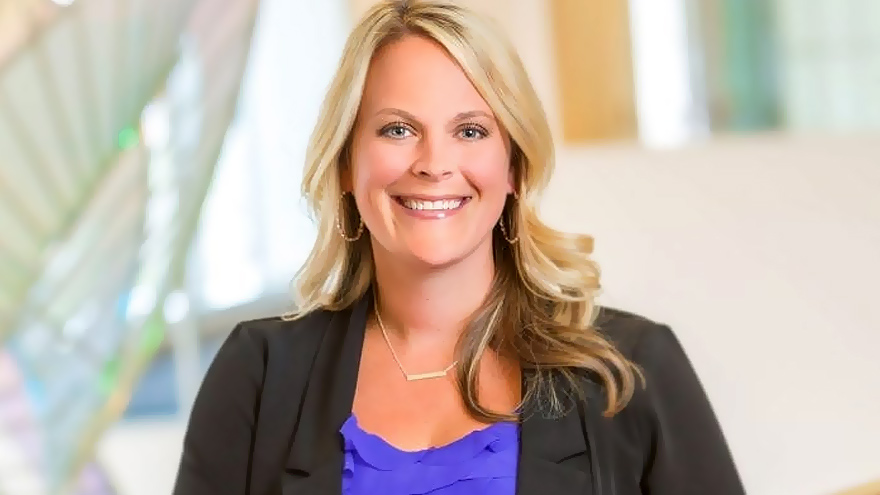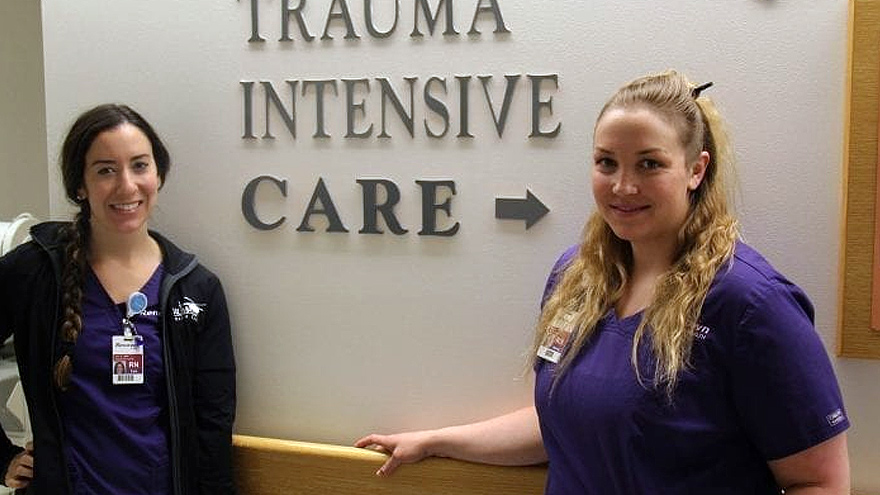Search
-
Healthy Nevada Project Returning Clinical Results to Participants
The Healthy Nevada Project – a first-of-its-kind population health study combining genetic, clinical, social and environmental data – has reached another landmark milestone. The study is notifying study participants at risk for familial hypercholesterolemia, BRCA and Lynch syndrome. “I took part in the Healthy Nevada Project to find out my ancestry. I didn’t even realize the test could give me so much information,” says 29-year-old Jordan Stiteler, who was recently diagnosed with familial hypercholesterolemia (also known as FH) through the Healthy Nevada Project. “After my dad passed away suddenly at age 45, I learned I had high cholesterol but I didn’t know it was genetic and I didn’t get an FH diagnosis until last week,” Jordan explains. “I immediately changed my diet, started walking more and doing more cardio. I also set up an appointment with my primary care physician for the first time in a while. I’ve talked with my family and even strangers about testing since my diagnosis. I hope my story will inspire others to test and can save someone’s family from going through the same loss I did.” Healthy Nevada Project Notifying Patients of Familial Hypercholesterolemia Risks Jordan is among the first Healthy Nevada Project participants to receive clinical results from the genetic study led by Renown Institute for Health Innovation (Renown IHI) – a collaboration between Renown and the Desert Research Institute Foundation. This groundbreaking population health study is now reaching out to study participants like Jordan, who asked to be notified of health risks. If study volunteers choose, the project will also provide guidance on treatment and additional testing for family members who may also be at risk. The project is starting with the return of FH risks which is a genetic tie to high cholesterol. Just a few months ago, a paper in the Journal of the American College of Cardiology recommended genetic testing become the standard of care for patients with a definite or probable FH diagnosis. Jordan says she plans to have her young son tested as well. “This is the future of health; not just reacting to sick people, but a coordinated effort between innovative technologies, data-driven researchers, and responsive practitioners to deliver personalized interventions to identify, prevent and treat disease,” says Anthony Slonim, M.D., Dr.PH., FACHE, president and CEO of Renown Health and president of Renown IHI. “As care providers, we often don’t see patients until they’re already sick and that’s a difficult problem. By embracing personal genomics, we can accelerate the ability of researchers to access data and apply those learnings back to our health system sooner.” In the Months Ahead: Notification of BRCA1/2 & Lynch Syndrome Risks The Healthy Nevada Project will start notifying study volunteers at risk for other CDC Tier 1 conditions including hereditary breast and ovarian cancer syndrome (BRCA 1/2 genes) and Lynch syndrome in the months ahead. These conditions are the key focus for the Healthy Nevada Project. The reason: Because early detection and treatment will save lives, and these conditions are some of the most common. “This research allows us to look into cancer, cardiac, respiratory illness and beyond to identify underlying causes, assess real risks and eventually initiate appropriate preventive actions much earlier. Human subject research is often intangible to participants – we are treated as subjects. The Healthy Nevada Project is creating actionable information for our participants while engaging in leading-edge research on health determinants,” said Joseph Grzymski, Ph.D., associate research professor at DRI, principal investigator of the Healthy Nevada Project and chief scientific officer for Renown Health. Landmark Population Health Study Continues to Expand Since launching two years ago, the Healthy Nevada Project has quickly evolved and expanded. The pilot project enrolled 10,000 participants in just 48 hours in September 2016. In March 2018, phase two of project expanded to an additional 40,000 participants with genetic testing partner, Helix. Helix’s genomic sequencing provides participants and researchers greater depth and quality of DNA data. With this, they can gain further insights to improve health. During a recent media roundtable announcing the return of clinical results, the Healthy Nevada Project also announced plans to complete testing of 40,000 people by the end of 2018. This will bring the project’s total enrollment to 50,000 people – approximately 10 percent of northern Nevada’s population. The Healthy Nevada Project hopes to reach more than 250,000 people in its next phase. The ultimate goal is to offer genetic testing to every Nevadan interested in learning more about their genetics and health. Join the Healthy Nevada Project Recruitment for phase two is still open. In addition to opting in to receive clinical results, participants receive National Geographic’s Geno 2.0 ancestry app at no cost. They also have the chance to pick an additional app for health and wellness after completing a follow-up survey. Learn More or Sign Up
Read More About Healthy Nevada Project Returning Clinical Results to Participants
-
MD, APRN or PA: What's the Difference
Having a primary care provider is important and some health insurance plans even require you to select one. But does that provider need to be a doctor (MD)? The good news is your primary care provider doesn’t need to be an MD. They can be an advanced nurse practitioner (APRN) or physician assistant (PA). We’re here to explain the differences between MDs, APRNs and PAs. Have you ever called Renown Health to schedule an appointment with your doctor and the Contact Center offered you an earlier appointment with an APRN or PA? Did you wonder why? Perhaps you even declined because you were concerned about the continuity of your care, or wondered about the qualifications of the other practitioners who aren’t doctors. We’re here to answer your important questions about primary care providers and the different types. Why would I want to see anyone other than a doctor? In order to keep up with demand for primary care services and provide the highest quality care possible, Renown created care teams. This means our doctors, APRNs and PAs all work hand-in-hand to manage your health with the benefit of their combined expertise. This team approach provides you with more flexible scheduling options to see anyone on the care team, all with the same continuity of care. How qualified are APRNs and PAs to treat patients? APRNs and PAs are highly educated in medicine with a minimum of a Master of Science degree and at least six years post-high school education. Some APRNs even have doctorate degrees. Similar to doctors, both positions have a minimum number of required clinic hours and participate in continued education. Both APRNs and Pas are just as qualified as doctors (MDs and DOs) to conduct physical exams, diagnose and treat illnesses, order and interpret tests, write prescriptions and even deliver babies. There are some instances where you need a doctor, including specialized treatment of complicated or high risk conditions or surgery. Your APRN or PA will refer you to a doctor in those instances. You don’t need to worry about whom to see when – your care team will guide you based on your medical needs. If I see an APRN or PA, will my doctor know about my visit? Absolutely. The care team system ensures that everyone on your care team is aware of the details of your visit, regardless of who you’re seeing. Everything is clearly documented in your medical record so there are no gaps in care between visits. Can an APRN or PA be my primary care provider? Definitely. APRNs and PAs make excellent primary care providers and can be established with your insurance company. Learn more about the differences between doctors, APRNs, PAs and more with this handy infographic. Schedule A Doctor Visit | 775-982-5000 Renown Medical Group primary care providers provide annual exams by appointment. Our providers coordinate each patient’s medical care including checkups, immunizations, referrals to specialists, lab work, X-ray & imaging and hospital admissions. Request an Appointment
-
What is a High-Risk Pregnancy?
You can still have a healthy pregnancy and baby if your pregnancy is high-risk. Learn what steps you can take to give your baby the best start possible. A “high-risk” pregnancy is one that threatens the health or life of the mother or her fetus. Women with high-risk pregnancies should receive care health care specialists to ensure the best possible outcomes. Some examples of a high-risk pregnancy include: Maternal age, women 35 and higher or 17 and younger Lifestyle choices, including smoking, drinking alcohol and illegal controlled substances Existing medical history, chronic hypertension, diabetes and breathing issues Multiple gestation, pregnancy with twins or triplets Overweight and underweight Remember: You can still have a healthy pregnancy and baby if your pregnancy is high-risk. Some ways to promote a healthy pregnancy: Schedule an appointment with your OBGYN Eat a balanced diet Avoid substances Prenatal care Healthy weight gain Reduce stress Exercise Pregnancy & Childbirth at Renown | 775-982-KIDS (5437) When you are expecting a new baby, you can depend on Renown Children’s Hospital for all your mom and baby healthcare needs. We can help you find the right doctor and tell you what to expect during your stay. We offer childbirth education classes and tours to help you prepare. Be sure to check out our virtual tours of our Labor Assessment Area.
-
Why Can't I Eat Before Surgery?
If you’re having surgery on your shoulder, why does it matter what’s in your stomach? We asked Dr. Matthew Hoberg to explain more about pre-surgery directives, including fasting. If you have an upcoming surgery, your care team likely gave you instructions to fast before your procedure. But why? We asked Matthew Hoberg, M.D., medical director of Renown Surgical Services, to explain why it’s important to forgo food and drinks before surgery. Why are patients instructed to fast before surgery? Regardless of surgery type or site, we want the stomach to be empty before having anesthesia, because anesthesia can reduce your body’s ability to protect and prevent food or acids from the stomach from entering the lungs. Normally, your body is able to prevent this, but anesthesia medicines make it harder for your body to do so. When food or liquids from the stomach get into the lungs, doctors call it “aspiration.” This is rare, but can be dangerous if it does happen. Solid foods and liquids leave the stomach at different rates too. Solid food takes longer to empty from the stomach than liquids, so the time to stop eating solids (eight hours) is longer than that for clear liquids (two hours). The body has energy reserves to produce needed nutrients and fuel during fasting. Recently, studies have shown it is important to stay hydrated and have some carbohydrates in clear liquids up to two hours before surgery, so clear liquids are allowed until two hours before surgery. There are also special rules for babies and young children who need surgery. For example, you may give breast milk up to four hours before surgery. If your baby drinks formula, you should stop six hours before surgery, and all solid foods you should stop eight hours before. Your child’s doctor or nurse will give you exact instructions. What if you show up for surgery and have broken the no-eating rule? Will surgery be re-scheduled? If patients have not followed the fasting guidelines, surgery will be postponed or rescheduled due to the possible increased risk associated with not having an empty stomach. The exception would be emergency surgery that cannot be delayed in which case special precautions are taken to help prevent anything from getting into the lungs. What other pre-operative rules should be followed to the letter? All instructions given to patients before their surgery or procedure should be followed. There are specific medical reasons behind all the instructions and they are designed for safety — to minimize risks, lower complications like infections and enhance the recovery process to help patients get back to normal as quickly as possible. Also, many patients ask if they should continue taking medications before surgery. The answer is: It depends. Your doctor or nurse will tell you which medicines you should take and when. Some medicines need to be stopped before surgery. But for others, it’s important you keep taking them as usual. You may also get new medicines to take before surgery. You may be asked to take some medications before surgery as part of advanced pain management protocols. If you need to take medicine right before your surgery, you can take it with a sip of water.
-
Super Easy Seared Salmon & Spring Salad
Watch Renown Chef Chris Wyatt blend zest and spice in this seared salmon and grilled veggie dish with a few secret ingredients. Are you looking for a new twist on an old stand-by dinner favorite while getting a heart-healthy dose of omega-3s? Look no further: Salmon recipes don’t get any easier than this. With this mouth watering recipe totaling in at just less than 350 calories, done in nearly 30 minutes, you’re going to want to make it your next meal. Added perk: Eating fish, such as salmon, twice a week has been found to lower the risk of heart attack and stroke over fish oil supplements.
-
Healthy Nevada Project: What We've Learned
As the Healthy Nevada Project expands to 50,000 study participants, researchers are sharing the health insights gleaned from the pilot phase of the project. Air pollution is a major health factor affecting northern Nevadans, according to data gathered by researchers in the pilot phase of the Healthy Nevada Project, one of the largest population health studies in the country. Today, the project — which began 18 months ago as a partnership between Renown Health and the Desert Research Institute — is expanding to add 40,000 additional participants bringing total enrollment to 50,000 Nevadans. “We are thrilled to share the first insights from our 10,000-person pilot phase and discuss how we will begin using those results to improve patient care,” says Anthony Slonim, M.D., Dr.PH., FACHE, president and CEO of Renown Health and president of Renown Institute for Health Innovation, a collaboration between Renown and DRI. Healthy Nevada Project Pilot Phase — and What Happens Next The pilot phase of the Healthy Nevada Project proved Nevadans are excited to know more about themselves and want to contribute to research that could improve health outcomes for the entire state. The pilot phase enrolled 10,000 participants in less than 48 hours and DNA sample collection from each participant was completed in just 69 working days. Based on pilot phase data, researchers have seen increased use of regional healthcare services correlated with fluctuations in air quality and so-called “bad air events” such as wildfires and atmospheric inversions. In phase two, Renown IHI will evaluate possible links between genetics and increased susceptibility to respiratory ailments. Study researchers also announced care providers and scientists will begin working on a number of clinical programs and scientific studies focused specifically on Washoe County’s high age-adjusted death rates for heart disease, cancer and chronic lower respiratory disease. Collectively, these conditions among local residents stand at 33 percent above the national rate. In the coming months, Renown IHI will begin providing advanced calcium score screenings to pilot phase participants at higher risk for cardiovascular disease. This will allow researchers to examine the link between genetics and calcium buildup in the heart. Researchers are also evaluating future studies focused on age-related macular degeneration and breast cancer risks in northern Nevada. Pilot Phase Insights Fifty percent of pilot study participants responded to a comprehensive, socioeconomic survey, which revealed: High rates of lower respiratory disease in northern Nevada and co-morbidities such as diabetes and hypertension suggest air pollution in northern Nevada is a confounding and significant factor in health. Study participants had parents who died from cancer and heart disease at a higher rate than the age-adjusted national average. Study participants exercised less than recommended by the American Heart Association and expressed interest in receiving help with behavior modification using diet/nutrition and weight loss tools. In phase two, if study participants choose to complete a follow-up survey, they will have the chance to pick an additional health and wellness app specific to their individual genetic results. Learn More To see if you are eligible to participate in the study, to sign up for study updates and for full details on the Healthy Nevada Project, please visit HealthyNV.org.
-
The Journey Within: Helping Others Through Grief
Learn more about a Renown Health nurse who formed a nonprofit to help other families through loss. After the unexpected loss of her young husband, a Renown Health nurse turned her grief into helping other families navigate the loss of a family member. Jen Walker, RN, MSN, director of clinical excellence, lost her high school sweetheart and husband of eight years when he passed away in October 2015, while their two boys, age 7 and 9, lost their father. Walker, a nurse at Renown since 2003, was overwhelmed by the outpouring of support she received from the Reno community. It inspired her to want to help others in the same situation. “After Travis passed, the community did some amazing things for me,” Walker says. “I got really motivated to do the same thing and to give back, so that’s when I came up with starting The Journey Within.” The Journey Within organization provides support and resources for young families who have lost a close family member. Before officially starting her organization, Walker used some of the money she received after her husband passed and personally donated to three families. And with the help of four board members, Jen officially started The Journey Within in February 2017, and they have helped six families so far. One of the board members is her sister, Anny Goff. “She thought of creating this foundation in the darkest time of her family’s life,” Goff says. “She knew there would be other families that would need help and support and immediately wanted to help others. It showed incredible strength and courage to keep moving forward.” Nursing Careers at Renown Health Nurses at Renown Health demonstrate a commitment to patients and their families through the integration of care, clinical expertise, education, evidence-based practice and the pursuit of quality patient outcomes. Learn more about our mission, vision and values and the benefits of a career in nursing at Renown Health today. Explore Nursing at Renown Walker’s organization supports families through financial donations, which she funds through two yearly fundraisers. The Travy Tourney is a golf tournament held in memory of Travis, and the “Let’s Toast to Travis Fundraiser” event raffles prizes and merchandise. Along with financial support, The Journey Within helps families connect with other community resources, such as counseling and grief therapy services. Walker hopes to expand her nonprofit’s fundraising and support for families beyond the Reno-Tahoe community. Because of her outstanding work at Renown and in the community, Walker recently received a 20 Under 40 award from the Reno-Tahoe Young Professionals Network. She has also received a Women of Achievement award, a Leader of the Quarter award and has been nominated four times for Northern Nevada Nurses of Achievement. “She is strong and resilient and cares a lot about people,” says Jen Richards, chief nursing officer, acute care services. “She never settles for the status quo and is always pushing our team to do better.” In navigating her own loss and starting a nonprofit to give back, Walker has learned a lot about the community. “I’ve gained a tremendous amount of respect for the community as a whole, but especially for the young community,” she says. “Seeing the young people in the community who have been willing to give back and live really selflessly has been amazing to me.” As someone who lost her husband, helping young families who have gone through the loss of a close loved one can hit close to home for Walker, but that doesn’t stop her — it fuels her. “That’s one of the hardest parts about doing this — it takes you back a little bit,” she says. “But it’s just a very good reminder of ‘why.’ Because when I get to talk with these families, I realize that now I am that person who is there to listen. I just want them to know that they’re talking to someone who’s been through something similar.”
Read More About The Journey Within: Helping Others Through Grief
-
Cold and Flu 101: What You Need to Know
Due to the stubborn nature of this year’s flu season, Hometown Health and Renown Health are adding additional flu shot events. Learn more about being protected and how to weather this year’s cold and flu season. Typical for this time of year, Renown is currently seeing a rise in patients with flu-like symptoms and other winter illnesses. To help protect the community, flu shots will be offered at the dates and times listed below: Friday, Feb. 23, 10 a.m. to noon Wednesday, Feb. 28, 5-7 p.m. Both flu shot events will be held at in the Hometown Health building located at 10315 Professional Circle, Reno NV 89521. These are walk-in flu shot events — no appointment required. No out-of-pocket costs for Medicare beneficiaries (Part B), Senior Care Plus members and Hometown Health fully insured HMO and PPO plans. Please bring your insurance card and current ID. Without a qualifying plan, the individual cost is $35. If you have questions regarding these flu shot events, please contact Hometown Health Wellness Services at 775-982-5433. And to help you weather the intense cold and flu season this year, we asked Kathleen Burns, an advance practice registered nurse at Renown Health, about flu prevention and how to know the difference between the flu virus and the common cold. How do you prevent the seasonal flu? The annual flu vaccine is truly the best form of protection to help prevent the spread of the flu. Even if you do get the flu after being vaccinated, your symptoms will be lessened. Flu vaccines are still available in the community, including health providers at Renown Medical Group. Call 775-982-5000 to make an appointment. Although they are not substitutes for the flu vaccine, simple preventative actions can do a lot to help slow the spread of the virus, including: Covering your mouth when coughing and staying away from people who are coughing. Washing your hands often. If you have the flu, stay home. If you have the flu and need to go out, including a visit to the doctor’s office, wear a protective mask. Other precautionary measures include cleaning shared spaces and avoiding shared utensils and drinks. Who should get the flu shot? Almost everyone. The Centers for Disease Control and Prevention recommends a yearly flu vaccine for everyone 6 months of age and older as the first and most important step in protecting against influenza. Different flu shots are approved for people of different ages, but there are flu shots that are approved for use in people as young as 6 months of age and up. Flu shots are approved for use in pregnant women and people with chronic health conditions. Bottom line: Your best chance of avoiding the flu this season is to get your flu vaccine. How do you know if it’s the flu or a cold? The flu and the common cold have similar symptoms and it can be difficult to tell the difference between the two. Your healthcare provider can give you a test within the first few days of your illness to determine whether or not you have the flu. In general, the flu is worse than the common cold. Symptoms such as fever, body aches, fatigue and cough are more common and intense with the flu. People with colds are more likely to have a runny or stuffy nose. Flu symptoms include: A 100 degree or higher fever or feeling feverish (not everyone with the flu has a fever) A cough and/or sore throat A runny or stuffy nose Headaches and/or body aches Chills Fatigue Nausea, vomiting, and/or diarrhea (most common in children) Does washing your hands really help prevent sickness like cold and flu? Yes. Again, the single best way to prevent seasonal flu is to get vaccinated each year, but good health habits like washing your hands often can help stop the spread of germs and prevent illnesses like the cold and flu. The proper way to wash your hands is to wet them with clean, running water (warm or cold) and apply soap. Lather your hands by rubbing them together. Be sure to lather the backs of your hands, between your fingers and under your nails. Scrub your hands for at least 20 seconds. If you need a timer, hum the “Happy Birthday” song from beginning to end twice. Rinse your hands well and dry them using a clean towel or air dry them. If soap and water are unavailable, use an alcohol-based hand sanitizer that contains at least 60 percent alcohol to clean hands. Other good health habits include covering your cough; avoiding close contact with people who are sick; staying home when you are sick; and practicing a healthy lifestyle by getting plenty of sleep, being physically active, drinking plenty of fluids and eating nutritious food.
-
Low Salt, Big Flavor! Spicy Oven-Fried Chicken
Looking for a low-sodium recipe that delivers high marks for taste? Try this Heart Association-approved recipe for oven fried chicken. Diets high in sodium can increase blood pressure, putting you at greater risk for stroke. But you don’t have to trade taste for better health. Take this recipe from the American Heart and Stroke Association: With spicy cayenne, tangy dry mustard and smoky paprika, you won’t miss the salt in this lightened-up southern classic.
Read More About Low Salt, Big Flavor! Spicy Oven-Fried Chicken
-
Name-Brand Medication vs. Generic: What's the Difference?
Most prescriptions meds are available in generic form. Find out the similarities and differences between the two and how to determine whether a generic is right for you. Approximately 80 percent of prescriptions sold today are generics. If you’re taking a prescription medication, chances are it’s a generic form of the brand-name drug. But are you getting the same quality in a generic medication? Do generics measure up? The answer in most cases is yes — generics, just like branded products, are regulated by the Food and Drug Administration. “To have a generic product approved by the FDA, the generic manufacturer must prove that its product is bioequivalent to the branded product,” explains Adam Porath, PharmD, BCPS AQ-Cardiology, BCACP and Vice President of Pharmacy Services. Basically, it has to function the same. “Generic products are extremely well tolerated and will provide the same results as using a branded product,” Porath says. Here’s how generics are the same as name-brand prescriptions: Generic products contain the same active ingredients. They produce the same desired clinical effect and accompanying side effects. Generics come in the same form as their branded counterparts: pill, liquid or inhaler, for example. Release into the bloodstream matches the name brand in timing and strength. Here’s how they differ: Generics generally cost less. Federal law requires generics have different names and look different: shape, size, markings and color. Generics contain different inactive ingredients, like binders, fillers and artificial colors. Different side effects with generics can usually be attributed to these additions. Why do generics cost less? When pharmaceutical companies develop a new drug, they are paying for research, development, clinical studies, marketing — in some cases it can cost more than $800 million and take 10 to 15 years to develop a new drug. “The manufacturers of branded medication products have to recoup their research and development costs,” Porath says. So companies are granted a limited patent to sell their drug without the competition of generic counterparts. “When patent exclusivity ends, the market is open for any generic manufacturer to make a competing product with FDA approval.” Without the same startup costs, companies can sell generics at 80 to 85 percent less. And because more than one company can produce the same generics, competition drives prices even lower.
Read More About Name-Brand Medication vs. Generic: What's the Difference?
-
Caring for the Whole Family: Renown Nurse Helps Patient with Ailing Pet
Registered Nurse Tori Tembey (left) shared how her co-worker and fellow RN Jennifer Payne helped a patient with his pet's end-of-life arrangements. "It was such a selfless act that Jennifer took the time to do this for the patient.” Tembey says. Pets become members of our own family, and when they are ill or at the end of their lives, it can be devastating for their owners. During a hospital stay, a Renown patient was faced with the difficult decision to euthanize their terminally ill pet. A Renown registered nurse stepped in to help in some pretty remarkable ways. Back in high school, Jennifer Payne wanted to be a veterinarian. She worked in a veterinary hospital and planned to attend veterinary school, but struggled with some of the situations she faced. “I have a lot of compassion for animals,” Payne explains. “And some of the things I saw while working at the vet — like people bringing in their cat saying, ‘I’m moving, you need to put this cat down’ — wasn’t OK with me, and wasn’t what I wanted to do.” She changed course and went into nursing, but recently drew upon her early experiences working with pets and their owners to help a Renown patient in an extraordinary way. Payne now works in the trauma intensive care unit at Renown Regional Medical Center, where she recently observed a county animal control officer visiting a patient. The patient was visibly upset — they learned their dog was terminally ill and in poor health, and a veterinarian was recommending euthanasia. The patient had lost another dog just before Christmas. The patient hoped to have his ill dog similarly cremated, but animal control does not perform cremation. “I overheard all of this and thought, ‘this is the most horrible thing I’ve ever heard,’” Payne says. She offered to pick up the dog, have him cremated and bring the ashes to the patient. She also took up a collection with her Renown colleagues to pay for the cremation. The next day — her day off — Payne and her young daughter picked up the ashes and brought them to the patient at the hospital. “He couldn’t even talk because he was crying so much,” Payne says. “He said ‘I can’t thank you enough for all you’ve done. You’re a wonderful person.’ There was a friend in the room who asked what my daughter’s name was, and I said ‘Estelle.’ The friend said, ‘Estelle, your mother is an angel.’” Payne, who has a golden retriever of her own, says she knows what it’s like to have “fur babies,” and she could see how important this dog was to the patient. “It was great to be able to do this for him,” she says. Renown salutes nurses like Jennifer Payne, who are making a genuine difference everyday in the lives of patients and in the community.
Read More About Caring for the Whole Family: Renown Nurse Helps Patient with Ailing Pet
-
Meatless Monday: Easy Gluten-Free Cauliflower Crust Pizza
Research shows that plant-based diets can help manage and even aid in the prevention of many chronic conditions such as diabetes, heart disease and cancer. Try incorporating more plant-based and meatless recipes into your diet — even if it’s just once a week. Here’s a delicious and easy pizza recipe to get you started. Cauliflower is finally getting its due. This nutritional powerhouse of a veggie is flying off the shelves as a low-carbohydrate substitute for grains and legumes. Why? The seemingly boring, white veggie is rich in antioxidants, nutrients, fiber and weighs in at just 25 calories per cup. And it’s great at camouflaging as rice, or in this case, as a base for pizza crust.
Read More About Meatless Monday: Easy Gluten-Free Cauliflower Crust Pizza
